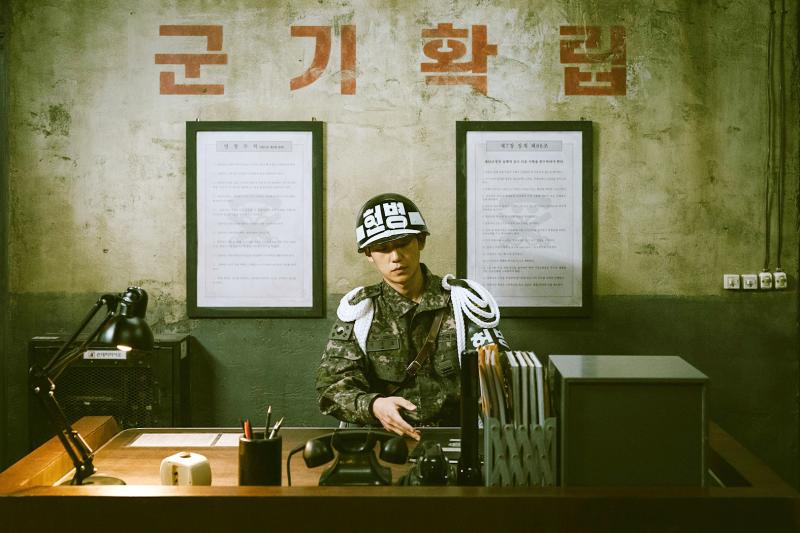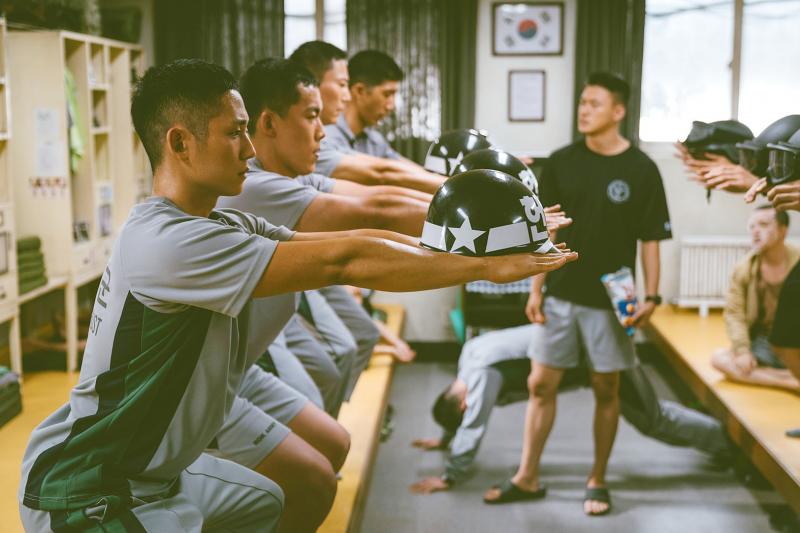A hit Netflix series is reigniting a debate in South Korea over the country’s massive military, its history of abuse scandals, and the mandatory conscription that fills its ranks with young men.
D.P., short for Deserter Pursuit, has been among the top Netflix shows in South Korea since it premiered at the end of August.
The series follows military police assigned to capture deserters, shining a light on daily life for many conscripts, including mental and physical abuse from other soldiers.

Photo: Reuters via Netflix
Director Han Jun-hee said he sought to tell a humanising story about how the system makes deserters both victims and criminals, as well as the toll it takes on those forced to do the hunting.
“D.P. is a story of tracing a deserter, but at the same time, it is a paradoxical story of looking for someone’s unfortunate son, brother, or lover,” Han said.
Asked about the popularity of the show, a defense ministry spokesman said that the military environment has changed and that the ministry has tried to stamp out abuse and harsh treatment.

Photo: Reuters via Netflix
Last week the military announced that even before the series came out, it had planned to do away with the system of having rank-and-file soldiers track down AWOL comrades. That change will go into effect in July next year.
South Korea maintains an active duty military of 550,000, with 2.7 million troops in reserves, amid decades of tensions with North Korea. All men must serve for up to 21 months, depending on the military branch.
South Korea’s military criminal law punishes desertion by up to 10 years in prison.
The Defense Ministry says abuse and desertion among conscripts are down, largely because of a 2019 decision to allow enlisted soldiers to use cellphones in their barracks.
The ministry declined to confirm the exact number of deserters, but South Korean media reported that 55 cases were reported last year, down from 78 in 2019. Military deaths by suicide also dropped from 27 to 15 in the same period.
HEATED DEBATE
The series landed as the country debates the future of conscription and the potential for abuse, particularly as young men facing dim economic prospects have complained of losing time to military service that they could have spent on studies or work.
In 2018 a Supreme Court ruling for the first time found that conscientious objection is a valid reason to forgo military service. Parliament last year passed a bill allowing K-Pop stars to postpone their military service to when they are 30.
The military has been rocked by multiple sexual abuse scandals this year, prompting lawmakers to pass a law that sex abuse and violent crime in the military will be handled by civilian courts.
Reaction to the series among former conscripts has been mixed, with some saying it mirrored their experiences, others saying its depictions of abuse are overblown, and some avoiding the show altogether to prevent traumatic memories from resurfacing.
“There is a scene in D.P. where they throw combat boots (at the soldier). I went through a lot of similar harassments,” said Ma Joon-bin, who described his time between 2013 and 2014 as the “dark ages.” “Now that I look back I feel it was unfair, but back then it was so common.”
Lee Jun-tae, 24, who served from 2017 to 2019, said he had never experienced or heard of any of his friends suffering abuse during their service.
“There was no harsh treatment during my time,” he said.
Last week the presidential favorite for the ruling party, Lee Jae-myung, called the stories in the series a “barbaric history” of South Korea. Hong Joon-pyo, an opposition party candidate, has said he endured cruelty as a soldier and pledged to consider moving to voluntary military service.
Ending conscription won’t solve all the problems if broader military culture doesn’t change as well, said pop culture critic Kim Hern-sik, who served as a D.P.
“As long as there is military service, whether mandatory or voluntary conscription system, problems are inevitable one way or another,” Kim said.

As Taiwan’s second most populous city, Taichung looms large in the electoral map. Taiwanese political commentators describe it — along with neighboring Changhua County — as Taiwan’s “swing states” (搖擺州), which is a curious direct borrowing from American election terminology. In the early post-Martial Law era, Taichung was referred to as a “desert of democracy” because while the Democratic Progressive Party (DPP) was winning elections in the north and south, Taichung remained staunchly loyal to the Chinese Nationalist Party (KMT). That changed over time, but in both Changhua and Taichung, the DPP still suffers from a “one-term curse,” with the

Jan. 26 to Feb. 1 Nearly 90 years after it was last recorded, the Basay language was taught in a classroom for the first time in September last year. Over the following three months, students learned its sounds along with the customs and folktales of the Ketagalan people, who once spoke it across northern Taiwan. Although each Ketagalan settlement had its own language, Basay functioned as a common trade language. By the late 19th century, it had largely fallen out of daily use as speakers shifted to Hoklo (commonly known as Taiwanese), surviving only in fragments remembered by the elderly. In

William Liu (劉家君) moved to Kaohsiung from Nantou to live with his boyfriend Reg Hong (洪嘉佑). “In Nantou, people do not support gay rights at all and never even talk about it. Living here made me optimistic and made me realize how much I can express myself,” Liu tells the Taipei Times. Hong and his friend Cony Hsieh (謝昀希) are both active in several LGBT groups and organizations in Kaohsiung. They were among the people behind the city’s 16th Pride event in November last year, which gathered over 35,000 people. Along with others, they clearly see Kaohsiung as the nexus of LGBT rights.

In the American west, “it is said, water flows upwards towards money,” wrote Marc Reisner in one of the most compelling books on public policy ever written, Cadillac Desert. As Americans failed to overcome the West’s water scarcity with hard work and private capital, the Federal government came to the rescue. As Reisner describes: “the American West quietly became the first and most durable example of the modern welfare state.” In Taiwan, the money toward which water flows upwards is the high tech industry, particularly the chip powerhouse Taiwan Semiconductor Manufacturing Co (TSMC, 台積電). Typically articles on TSMC’s water demand